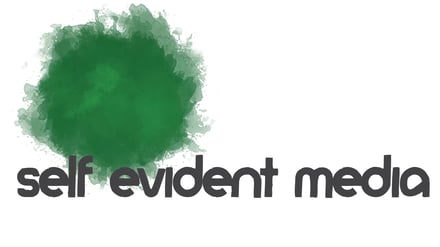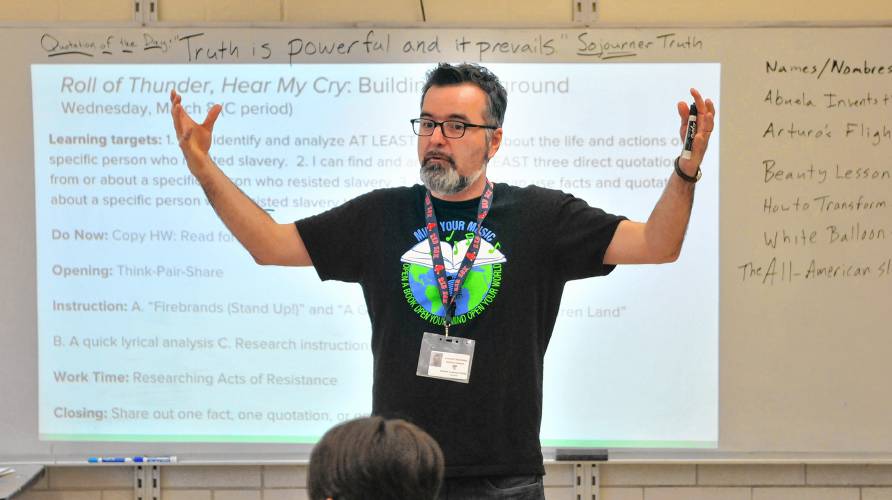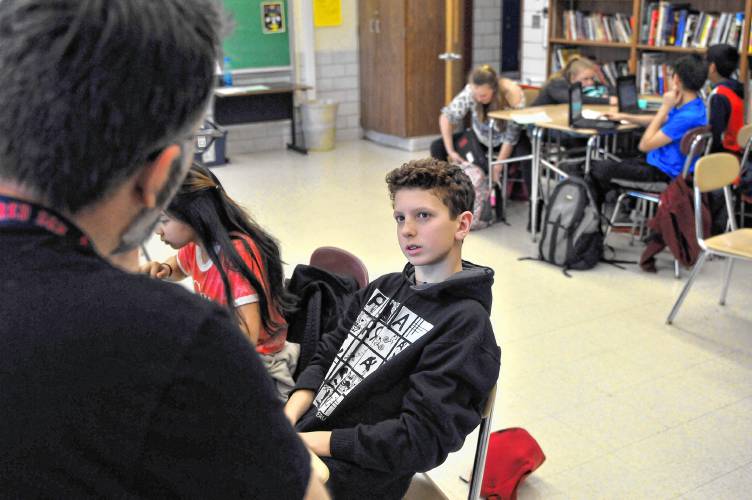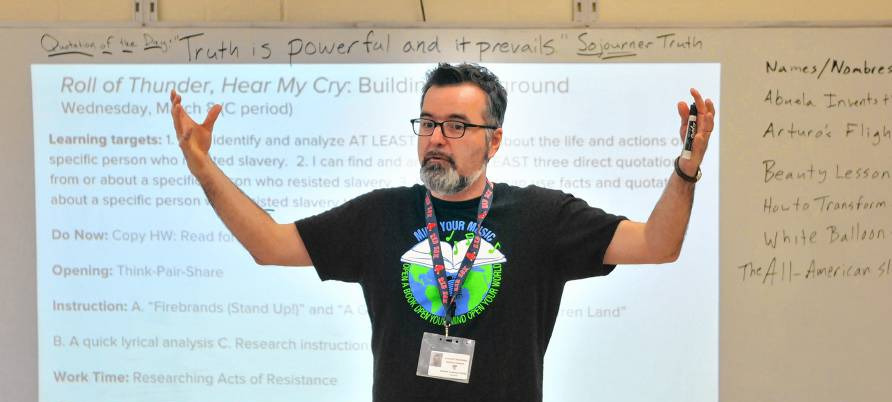Member Spotlight: Self-Evident Media
Michael Lawrence-Riddell is an experienced educator. During his 20 year career, he has taught middle school math, social studies, and language arts. He has taught in elementary, middle, and high schools, and is the recipient of the Pioneer Valley Excellence in Teaching Award from the Harold Grinspoon Foundation and the Fellowship for Entrepreneurship in Education from Mount Holyoke College.
Based in Florence, MA, one of his primary driving forces as an educator is to share how institutional racism has functioned in and shaped the United States. Throughout his years, he has noticed a lack of quality educational materials that dealt with the history and legacy of racism, and a specific lack in educational materials that were appropriate and engaging for contemporary, digitally-savvy students. So, he decided to create his own.

Through Self-Evident Media, he creates “highly engaging, multimedia educational tools for educators, students, and communities.” His goal is to “inspire critical conversations about the histories and legacies of the creation and weaponization of race.”
As a fiscally sponsored project since October 2019, Self-Evident Media has been able to raise funds to build out multimedia curricula. Now that both virtual learning and anti-racist resources are top-of-mind for educators in new ways, Lawrence-Riddell is working quickly to get his materials into classrooms as soon as possible.
Teaser trailer from Benjamin Banneker module
Tell us about your work. What inspired it and how do you hope it will impact people?
I founded Self-Evident Media in response to the urgent need for our society to honestly and rigorously engage in work to understand the histories and legacies of race and institutional racism.
I was inspired, in part, by my time as an African-American Studies major at Wesleyan University and by my work as a teacher of American History. After continually witnessing the failures of our nation to reckon with its racial inequities, past and present, I wanted to do something to make change in my classroom. I wanted to teach the history of this nation in a way that examined how systemic racism has been created and functions. I also wanted to communicate to students in a cultural language that they understood: a multimedia lexicon. When, in my professional work, I found these materials did not exist in a high-quality and effective form, I set out to help create them. Self-Evident Media envisions a world where all young people understand and honestly assess the ways that race and racism have been intentionally constructed. Through this education they will be able to accurately analyze the present, and imagine a future where racism can be intentionally dismantled.
In general, our target audience is middle and high school students. However, we feel like younger students, third grade and up, depending on support from their teachers, could also benefit from many of the stories we plan to tell.
Because the American public does not critically understand the history and legacies of racism, they cannot put contemporary institutional racism (including, but not limited to: mass incarceration, unemployment, wealth inequality, police brutality, access to opportunity) into its proper context.
Many teachers want to engage with the important histories and legacies of systemic racism, but they don't have the experience or resources to know how to do it honestly and rigorously, and so they simply avoid it. This continues to perpetuate a lack of deep understanding of our past.

Describe the process you've taken to bring your project to life. What's been involved?
I began the process by creating a plan for what I believed to be some of the key stories from the history of the United States that would help people to critically examine the histories and legacies of institutional racism and vetting that list with multiple scholars of African American Studies.
I began reaching out to people in my network who I have known for decades, and thus our histories of talking about how to use education as an explicitly anti-racist space and tool are long, varied, and deep. When I think about the incredible advisory board working with Self-Evident Media, one of the things that make them such a strong and effective force is the fact that I have known and worked with all of the members for at least a decade. Everyone on the advisory board is someone who I have known and respected for quite some time, so there is a built in understanding about the ways that we all work and think that has allowed us to get right to work. Bayeté Ross Smith and I have known each other since 1989. He has been such an integral part of figuring out the proper aesthetics for the stories we are telling, and also a huge help honing our plan and sharpening our vision. The people on the Self-Evident advisory board are such a diverse group in their ways of thinking, expertise, backgrounds, knowledge, and experiences. Some of the critical pieces of the early stage were definitely creating a plan and assembling a team.
I then conducted a landscape review on multimedia educational theory and practice as well as a landscape review of the ways that race is being taught and conceived of in the popular consciousness. In order to take this project on, I felt I needed to better understand how to leverage the powers of multimedia education and I needed to have a deeper understanding of the ways that systemic racism and its histories and legacies are and are not being taught.
I then began working on putting together a mock-up (using my rudimentary and amateur skills) of the type of multimedia resources I hope we could build. It was when I was able to raise enough money from a few incredibly generous believers, that I was able to start hiring professional filmmakers to help bring my ideas out of my head and into the world in an incredibly dope way. Shout out to the team at Rainlake!
What have been your biggest challenges with this work?
[One of my challenges is] funding. I am trying my hardest to make Self-Evident Media my full time job. In order to do that we need to keep raising money. Focusing on raising money makes it harder to focus on creating resources for teachers to use in their classes.
[Additionally,] focusing on what are the stories that really must be told. There are a nearly inexhaustible number of stories that could be told to highlight the ways that systemic racism has functioned, and does function in the United States. We have spent a lot of time developing essential questions and Big Ideas that we are using to direct our vision for the stories we develop. We are paying special attention to stories from our history that make clear the ways that race was codified and highlight the through lines to today of those laws.
What are all of the kinds of media that Self-Evident produces? How do you structure your projects or lessons?
At this point the main resources we are focused on building are multimedia, narrative episodes that tell the stories of people, movements, moments, and ideas that connect to the Big Ideas about how race has and does function in the United States. In our episodes we focus on dynamic animations to draw people into our stories, archival material that bring moments to life, and music that helps to tell the stories. We are also developing podcasts that will be part of the resources that teachers will have access to when they access our work.
You've been focused on digital education resources since before schools shut down. What is the benefit, to you, of a digital focus?
The past two decades have been a time of intense growth in the ways that students, teachers, and the world in general interface with and are influenced by digital media. Many people who are teaching today did not have teachers who demonstrated how to integrate multimedia into classrooms, but the students today are digital natives and thus the education they receive must be imbued with an understanding of that world. As teachers of digital natives, we must consider the positives and also the potential negatives of the digital world that our students inhabit. Properly constructed and implemented, multimedia lessons can be a powerful force in the classroom; they have power as a tool of knowledge sharing, from teacher to student, and knowledge production, from students to a wider audience.
The power of imagery and the power of stories are central to the work that we do. So much of what people believe about their world or about their history is based on the images we are shown and also what is outside of those frames. Multimedia storytelling allows us to enter into conversations about structural racism by appealing to the human desire for narrative. Scientific data shows that stories change our attitudes, beliefs, and behaviors.

Anti-racist educational resources and virtual learning are top of mind for educators, parents, students, and everyone else. How has this impacted Self-Evident Media? Has this changed how you think about your work or who is engaging with it?
We recognize the positionality of anti-racist educational resources and virtual/digital learning as priorities for many educators right now. To that end we have stepped up our outreach to educational communities who would be interested in piloting our materials during the upcoming school year to give us feedback and data about how teachers and students are using them. We are actively seeking partners to work with us to get our critical resources into classrooms for the 2020-2021 school year.
There has been quite a lot of interest from school leaders and teachers who have seen some of what we are working on. Thus, we have definitely shifted some of our focus into getting materials ready for the beginning of the school year. At the same time, we remain committed to prioritizing doing this work well over doing it quickly. When we started working together, my advisory board and I knew that this work was critical. We knew that we are living in a society that is perpetually hampered in its movements toward justice by the fact that we have never truly, honestly, and rigorously owned and reconciled the injustices of our past. We cannot even imagine a just future, much less create a just future, until we honestly understand our past. This remains the center of our mission and our vision. If the present moment means more eyes are open to the histories and legacies of the creation and weaponization of race, then we welcome the chance to be a part of this centuries long overdue work.
Which Fractured Atlas tools and services have you taken advantage of? How have you used them to support your artistic practice?
Definitely the Knowledge Base, the crowdfunding platform, the support phone number and email.
The knowledge base is wonderful. So many of the questions that I have are answered on the knowledge base. The crowdfunding platform was easy to use and very functional. The email and phone support have been incredibly helpful. Every individual with whom I have spoken or communicated via email has been helpful and knowledgeable and they clearly care about me and my project.
What has been most useful to you about your Fractured Atlas membership?
Having an established organization which can facilitate access to charitable giving for the project has been incredible. Fractured Atlas has given Self-Evident Media the ability to begin conversations with all sorts of funders, from grassroots, to major gifts, to foundations…Thanks to our fiscal sponsorship we have raised over $80,000 which we have used to hire the creative team at Rainlake and to pay musicians and artists to take our multimedia storytelling to the next level.
What does the future of Self-Evident Media look like? What's next for you that we should be keeping an eye out for?
For us, the future looks like creating more and more resources for educational communities. The next year will be a year for beta-testing our resources, building more resources, connecting with more educators, and getting our materials in front of as many students and other audiences as we can. Be on the lookout for online screening events.
We have piloted an early draft of one of our episodes with a local private school and I have used some of our materials with my students recently at the Vela Scholars summer program in Amherst, MA. We have over 10 schools who are committed to piloting our materials in the upcoming school year and many others who have expressed interest. We currently have two episodes which are done and ready to be used and plan to have at least four modules (an episode, curricular resources, and some PD elements) done by the fall, with a plan to have at least eight done by the end of 2020:
[The modules will be about] Benjamin Banneker and his letter to Jefferson, Elizabeth "Mumbet" Freeman and the abolition of slavery in Massachusetts, Elizabeth Key and the law that made it so the status of a child was determined by the status of the mother, and the Red Summer of 1919, focused specifically on Elaine, Arkansas and Omaha, Nebraska.
To keep up with Self-Evident Media, follow them on Facebook, Twitter, and Instagram.
You can support Self-Evident Media on their Fractured Atlas funding page!.
About Nina Berman
Nina Berman is an arts industry worker and ceramicist based in New York City, currently working as Associate Director, Communications and Content at Fractured Atlas. She holds an MA in English from Loyola University Chicago. At Fractured Atlas, she shares tips and strategies for navigating the art world, interviews artists, and writes about creating a more equitable arts ecosystem. Before joining Fractured Atlas, she covered the book publishing industry for an audience of publishers at NetGalley. When she's not writing, she's making ceramics at Centerpoint Ceramics in Brooklyn.


